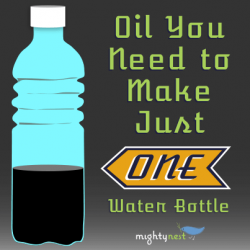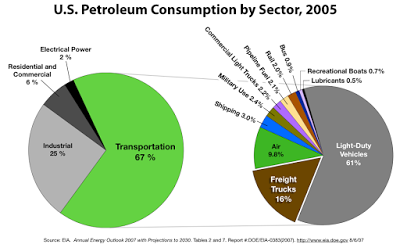Make Your Life Less Oily in 2017: Part I, Taking Stock

The United States is the oiliest country on the planet. We Americans consume more oil by far than any other country. Next is China, but even with 1.4 billion people they’re a distant second. Americans, in fact, consume 20% of the world’s oil each year, over 19 million barrels a day. Last year US oil consumption worked out to 923 gallons per man, woman and child. Oil is a worldwide commodity. Because its consumption is so enormous, US demand drives both the price of oil and the profits it produces. And for all the talk of the US being energy independent, the US also imports the most oil of any country in the world. (China, again, is a distant second.) Americans are literally and figuratively in the driver’s seat of world oil consumption. (Canadians actually use more oil per person, but because their population is so much smaller, they have much less of an impact.)
Now if funneling profits and power to multinational oil corporations and Saudi Arabia doesn’t bother you, read no further. If you’re fine with indirectly funding terrorism, or if having a future Secretary of State who is the head of ExxonMobil doesn’t freak you out a bit, this article is not for you.
But if you stand with Standing Rock, read on. If the stonings and beheadings in Saudi Arabia trouble you, if you’re not fond of crude oil spills every other day in the US, if you’re not a fan of tar sands and fracking, or if you understand that the only way to prevent climate catastrophe is to leave much of what’s left of fossil fuels in the ground for at least the next couple centuries, then you might find this two-part article useful.
 Pinguid livingLet's face it, America, our lives are saturated in oil, and reducing that pinguidity (there’s a word for you!) is not an easy task. We’ve got oily transport, oily heating, oily beverages, oily food, we drive on oily roads, and our homes are full of oily stuff. How do we get some or all of that oil out of our lives?
Pinguid livingLet's face it, America, our lives are saturated in oil, and reducing that pinguidity (there’s a word for you!) is not an easy task. We’ve got oily transport, oily heating, oily beverages, oily food, we drive on oily roads, and our homes are full of oily stuff. How do we get some or all of that oil out of our lives?Most of our consumption of oil is so deeply embedded in our way of life that we're unconscious of it or believe there's no alternative. The antidote is to first make that consumption conscious and then get creative with alternatives, tailoring them to our specific situations. Here’s the good news: most of the steps you can take to purge oil from your life will make you healthier, happier, and your household more resilient! If you have kids, many of the steps will make them healthier, happier and perform better in school! Many of the steps will also make your community healthier, more prosperous, and more resilient. And if your prosperity is linked to your community’s prosperity, it will make you more prosperous as well.So let's bring the unconscious to the light of day. Just how oily is your life?

How we move ourselves around this planet matters. A lot. And our driving is the big kahuna. Two-thirds of American oil consumption is from transportation; close to two-thirds of that we do in cars. We can freak out about freight and air travel, but it's the daily moving about in private cars powered by internal combustion engines that is the single biggest oil slurper in our lives. To examine your oil consumption, including how oily your travel is, I've created this nifty calculator to help put a number to it. You fill in the orange boxes (replacing values if applicable), and the green boxes will calculate your oil gallons consumed. In some of the orange boxes I've put average American values. You can decide how appropriate they are for you. Be sure to scroll to the bottom of the frame to see your total. Remember, we're not looking at all energy consumed, nor are we looking at our carbon footprint. Our laser-like focus here is concentrated solely on oil and its products.
A few words about oily home heat. Only 8% of US households use heating oil. If yours is one of them, you probably have records of how much you use, but, for example, the average Massachusetts heating oil home uses 987 gallons per year. Only 5% of homes use propane, and only 31% of all propane comes from oil refineries. (The rest is from natural gas.) Put in total propane you use and the calculator will take 31% of it. An average Massachusetts propane-heat house uses 886 gallons a year.
 Why? Why? Why?For oily beverages, how many PET plastic bottles of water or soda do you consume a week, on average? Your fellow citizens consume 4.5, using up 9.1 gallons of oil a year.
Why? Why? Why?For oily beverages, how many PET plastic bottles of water or soda do you consume a week, on average? Your fellow citizens consume 4.5, using up 9.1 gallons of oil a year.Plastic bags. The average American throws away 10 a week. That's another 2.2 gallons of oil per year. If you throw away more or less, adjust accordingly.
 Non-oily 1 week of food in Bhutan (photo: Peter Menzel, Hungry Planet)How about food oiliness? The average American consumes one ton of food a year. No, I'm not kidding. Each pound travels an average of 1500 miles to get to you. No, I'm not kidding. The oil it takes to truck this ton of food to a store near you comes out to 44 gallons a year. You eat local, you say? If you got 100% of your food from an average distance of 150 miles, that would come to 4.4 gallons of oil a year. Remember, this in no way includes all the fossil fuels embedded in your food since natural gas is the number one energy source used by fertilizer and grain drying, and food processing and refrigeration largely use electricity.
Non-oily 1 week of food in Bhutan (photo: Peter Menzel, Hungry Planet)How about food oiliness? The average American consumes one ton of food a year. No, I'm not kidding. Each pound travels an average of 1500 miles to get to you. No, I'm not kidding. The oil it takes to truck this ton of food to a store near you comes out to 44 gallons a year. You eat local, you say? If you got 100% of your food from an average distance of 150 miles, that would come to 4.4 gallons of oil a year. Remember, this in no way includes all the fossil fuels embedded in your food since natural gas is the number one energy source used by fertilizer and grain drying, and food processing and refrigeration largely use electricity. Stuff and more stuffHow about all the rest of the bejeebus amount of stuff we buy in a year? It weighs roughly another ton per person. No way, you say! Remember, this ton includes 125 lbs for your half of one car (3500 lbs divided by 14 years of car life), and your share of household appliances divided by their useful life. What's worse is that to make this 2000 lbs of stuff for you, industry in the US and other parts of the world moves, mines, extracts, shovels, burns, waste, pumps and disposes of one million pounds of material. All this material manipulation and far-flung worldwide supply chain of raw materials, feedstocks, and components uses a lot of oil. (Also a lot of natural gas and a fair amount of electricity. But let's just consider oil.) A low estimate is 1/2 gallon per ton. That makes 250 gallons of oil embedded in your yearly non-food stuff consumption. This number includes all the rest of the plastic and any polyester or nylon you consume in a year and the ridiculous amount of packaging that your stuff comes in, but it doesn't include shipping the final product to you. Let's figure half the stuff is made in the US and comes by truck; the other half is made in Asia and comes by ship, then rail, and then truck. (You can change these percentages.) If you think you consume more or less stuff than the average American, adjust accordingly.
Stuff and more stuffHow about all the rest of the bejeebus amount of stuff we buy in a year? It weighs roughly another ton per person. No way, you say! Remember, this ton includes 125 lbs for your half of one car (3500 lbs divided by 14 years of car life), and your share of household appliances divided by their useful life. What's worse is that to make this 2000 lbs of stuff for you, industry in the US and other parts of the world moves, mines, extracts, shovels, burns, waste, pumps and disposes of one million pounds of material. All this material manipulation and far-flung worldwide supply chain of raw materials, feedstocks, and components uses a lot of oil. (Also a lot of natural gas and a fair amount of electricity. But let's just consider oil.) A low estimate is 1/2 gallon per ton. That makes 250 gallons of oil embedded in your yearly non-food stuff consumption. This number includes all the rest of the plastic and any polyester or nylon you consume in a year and the ridiculous amount of packaging that your stuff comes in, but it doesn't include shipping the final product to you. Let's figure half the stuff is made in the US and comes by truck; the other half is made in Asia and comes by ship, then rail, and then truck. (You can change these percentages.) If you think you consume more or less stuff than the average American, adjust accordingly.I'm getting tired, and no doubt you are too, of slogging through all this oil, but we'll go just a bit further. Your on-line shopping deliveries. Now the United States Postal Service comes to your house and puts junkmail in your box whether you get anything else or not, so your share of USPS oil (average 500 stops a day, 18 miles, 9 mpg) is a flat 1.25 gallons per year if you live in suburbia regardless of how many packages you get. If you live ex-urban, double that. If you live urban, cut it in half.
 Future Electric Delivery?For Fed-Ex and UPS deliveries, enter the average number of times each one visits you a week, not packages per week. Count all package deliveries you order, including ones you send as gifts, but not ones you receive as gifts. If a large percentage of deliveries are for your household in general, only attribute to yourself your share.
Future Electric Delivery?For Fed-Ex and UPS deliveries, enter the average number of times each one visits you a week, not packages per week. Count all package deliveries you order, including ones you send as gifts, but not ones you receive as gifts. If a large percentage of deliveries are for your household in general, only attribute to yourself your share. Spa treatmentAnd now you have a final total. Admittedly, this calculator isn't perfect, but I think you'll find it's not bad. It doesn't include asphalt for roads or oil consumed on your behalf by various government entities (roughly another 30 gallons covers both, depending on how many wars we are actively involved in) and numerous other small items like asphalt roofs, detergents, antifreeze and antihistamines, but it does include most of what you're likely to personally impact. Your yearly oil consumption may not fill a swimming pool, but it would probably overflow ten to twelve bathtubs or even a good-sized jacuzzi. So would the oil consumption of everyone else in your household, every one of your neighbors, every one of your friends. For comparison, your average Brit consumes 372 gallons of oil per year, your average Chinese 134 gallons, and your average Bangladeshi 10 gallons.
Spa treatmentAnd now you have a final total. Admittedly, this calculator isn't perfect, but I think you'll find it's not bad. It doesn't include asphalt for roads or oil consumed on your behalf by various government entities (roughly another 30 gallons covers both, depending on how many wars we are actively involved in) and numerous other small items like asphalt roofs, detergents, antifreeze and antihistamines, but it does include most of what you're likely to personally impact. Your yearly oil consumption may not fill a swimming pool, but it would probably overflow ten to twelve bathtubs or even a good-sized jacuzzi. So would the oil consumption of everyone else in your household, every one of your neighbors, every one of your friends. For comparison, your average Brit consumes 372 gallons of oil per year, your average Chinese 134 gallons, and your average Bangladeshi 10 gallons.As you can see, oil seeps through the fabric of our existence even if we never actually see it, its viscous liquor oozing through our daily lives whether we like it or not. So what do we do with all this oil? How do we squeeze the oiliness out of our lives?
Stay tuned for part two!
Note: Gallons. I know, I know, when discussing anything to do with energy, joules or even BTU's would be better, but most people have little intrinsic understanding of either, while nearly everyone knows what a gallon is. Plus the lion's share of transportation data uses gallons. So I went with it.
Published on December 14, 2016 22:57
No comments have been added yet.



